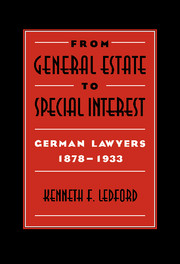Book contents
- Frontmatter
- Contents
- List of Illustrations
- Hierarchy of Courts
- Glossary of Legal and Other Terms
- Abbreviations
- Preface
- 1 The Archimedean Point: Lawyers, Liberalism, and the Middle-Class Project
- 2 Freie Advokatur: The Blending of the Middle-Class and Professional Projects
- 3 Foundation of the Modern Profession: The Private Bar under the Lawyers' Statute
- 4 Institutional Framework: Lawyers and Honoratiorenpolitik
- 5 Growth and Diversification: Lawyers in the Province of Hannover, 1878–1933
- 6 Elites and Professional Ideology: Self-Discipline and Self-Administration by the Anwaltskammer Celle
- 7 Simultaneous Admission: The Limits of Honoratiorenpolitik
- 8 The Limits of Economic Liberalism: Freie Advokatur or Numerus Clausus?
- 9 The Limits of Political Liberalism: Lawyers and the Weimar State
- 10 Conclusion: Lawyers and the Limits of Liberalism
- Methodological Appendix
- Bibliography
- Index
4 - Institutional Framework: Lawyers and Honoratiorenpolitik
Published online by Cambridge University Press: 11 September 2009
- Frontmatter
- Contents
- List of Illustrations
- Hierarchy of Courts
- Glossary of Legal and Other Terms
- Abbreviations
- Preface
- 1 The Archimedean Point: Lawyers, Liberalism, and the Middle-Class Project
- 2 Freie Advokatur: The Blending of the Middle-Class and Professional Projects
- 3 Foundation of the Modern Profession: The Private Bar under the Lawyers' Statute
- 4 Institutional Framework: Lawyers and Honoratiorenpolitik
- 5 Growth and Diversification: Lawyers in the Province of Hannover, 1878–1933
- 6 Elites and Professional Ideology: Self-Discipline and Self-Administration by the Anwaltskammer Celle
- 7 Simultaneous Admission: The Limits of Honoratiorenpolitik
- 8 The Limits of Economic Liberalism: Freie Advokatur or Numerus Clausus?
- 9 The Limits of Political Liberalism: Lawyers and the Weimar State
- 10 Conclusion: Lawyers and the Limits of Liberalism
- Methodological Appendix
- Bibliography
- Index
Summary
In 1882, the secretary of the German Bar Association (“DAV”), Hermann von Mecke, acclaimed the entry into effect of the Imperial Justice Laws of 1877–9 as the “formation of the practicing bar into a profession.” But in many ways, Mecke's pronouncement misunderstood the nature of the innovation introduced by the Imperial Justice Laws, particularly in the structure of the professional institutions of the private bar. He underestimated the degree of change that had already occurred, for the legislation of 1877–9 did not write upon an institutional tabula rasa. Since the 1830s, lawyers had participated vigorously in the bürgerlich project of creating a “bourgeois public sphere,” constructing by 1871 an increasingly dense network first of local, then of state, and ultimately of national professional associations that continued to exist until 1933. This web of associations formed an important part of the milieu of the lives of lawyers, and the practices that the private bar had invented in the process of their creation structured the ways that lawyers responded to the new opportunities created by the Imperial Justice Laws and by the subsequent demographic and career-pattern changes that they introduced.
Mecke's assessment also overestimated the innovation created by the reforms in that he presented them as fully formed. But the Lawyers' Statute (“RAO”) had only set forth a framework for the long-sought-after mandatory-membership lawyers' chamber for each court of appeal district, for the first time including every lawyer in Germany within a self-governing professional institution.
- Type
- Chapter
- Information
- From General Estate to Special InterestGerman Lawyers 1878–1933, pp. 87 - 118Publisher: Cambridge University PressPrint publication year: 1996



